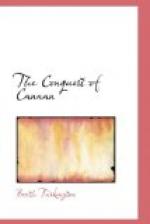As she came to her half-stop of surprise, startled, he took his courage in two hands, and, lifting his hat, stepped to her side.
“You—you remember me?” he stammered.
“Yes,” she answered, a little breathlessly.
“Ah, that’s kind of you!” he cried, and began to walk on with her, unconsciously. “I feel like a returned ghost wandering about—invisible and unrecognized. So few people seem to remember me!”
“I think you are wrong. I think you’ll find everybody remembers you,” she responded, uneasily.
“No, I’m afraid not,” he began. “I—”
“I’m afraid they do!”
Joe laughed a little. “My father was saying something like that to me a while ago. He meant that they used to think me a great scapegrace here. Do you mean that?”
“I’d scarcely like to say,” she answered, her face growing more troubled; for they were close on the imperial domain.
“But it’s long ago—and I really didn’t do anything so outrageous, it seems to me.” He laughed again. “I know your father was angry with me once or twice, especially the night I hid on your porch to watch you—to watch you dance, I mean. But, you see, I’ve come back to rehabilitate myself, to—”
She interrupted him. They were not far from her gate, and she saw her father standing in the yard, directing a painter who was at work on one of the cast-iron deer. The Judge was apparently in good spirits, laughing with the workman over some jest between them, but that did not lessen Mamie’s nervousness.
“Mr. Louden,” she said, in as kindly a tone as she could, “I shall have to ask you not to walk with me. My father would not like it.”
Joe stopped with a jerk.
“Why, I—I thought I’d go in and shake hands with him,—and tell him I—”
Astonishment that partook of terror and of awe spread itself instantly upon her face.
“Good gracious!” she cried. “No!”
“Very well,” said Joe, humbly. “Good-bye.”
He was too late to get away with any good grace. Judge Pike had seen them, and, even as Joe turned to go, rushed down to the gate, flung it open, and motioned his daughter to enter. This he did with one wide sweep of his arm, and, with another sweep, forbade Joe to look upon either moon or sun. It was a magnificent gesture: it excluded the young man from the street, Judge Pike’s street, and from the town, Judge Pike’s town. It swept him from the earth, abolished him, denied him the right to breathe the common air, to be seen of men; and, at once a headsman’s stroke and an excommunication, destroyed him, soul and body, thus rebuking the silly Providence that had created him, and repairing Its mistake by annihilating him. This hurling Olympian gesture smote the street; the rails of the car-track sprang and quivered with the shock; it thundered, and, amid the dumfounding uproar of the wrath of a god, the Will of the Canaanite Jove wrote the words in fiery letters upon the ether:




